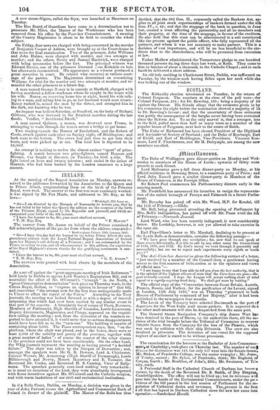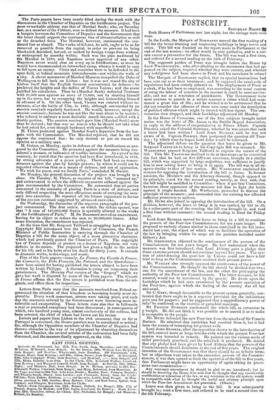itlistelIantotts.
The Duke of Wellington gave dinner-parties on Monday and Wed- nesday to members of the House of Lords ; upwards of thirty were present at each dinner.
Lord Melbourne gave a full dress dinner-party on Monday, at his official residence in Downing Street, to a numerous party of Peers ; and Lord John Russell gave a similar dinner-party to Members of the House of Commons, at the Foreign Office.
Sir Robert Peel commences his Parliamentary dinners early in the ensuing month.
Mr. Freshfield has announced his intention to resign the representa- tion of the united borough of Penryn and Falmouth in a future Parlia- ment.
Mr. Barneby has paired off with Mr. Wood, M.P. for Kendal, till the 11th of February.—Globe.
Mr. Bell, being prevented attendiug the opening of Parliament by Mrs. Bell's indisposition, has paired off with Mr. Pease until the 5th of February.—Newcasde Journal.
Lord Ward, who has been recently indisposed, is now considerably better. His Lordship, however, is not yet allowed to take exercise in the open air.
Earl Fitzwilliam's letter to Mr. Marshall, declining to be present at the Lteds Reform demonstration, contains the following passage-
" We have gone through one revolution ; for, now that we can speak of those events him orically, it is idle to call by any other name the transactions of 1830, 1831, and 1832. By God's mercy we went through it peaceably and successfully; but are we to repeat such experiments every eighth or tenth peer?"
The Ana-Corn-law Association gives the following extract of a letter, " just received by a member of the Council from a gentleman having access to the first sources of infor.nation as to the opinions and views of official men "- " I am happy to say that I am able to tell you from the beet authority, that it is the opinion of the highest officers of state that the Corn-lazes are gone—Re- peal virtually carried. I hope the League will accept nothing short of total repeal or a rapidly-expiring fixed duty. We shall get more by waiting."
The official copy of the "Convention between Great Britain, Austria, Prussia, Russia, and Turkey, for the pacification of the Levant, signed at London, 15th July 1840," was on Thursday "presented to both Houses of Parliament by command of her Majesty," after it had been published in the newspapers four months.
The Lords of the Treasury have selected Dartmouth as the port of departure for the West India mail steam-packets. It is expected that the other mail-steamers will also be despatched from the same port.
The General Steam Navigation Company's ship James Watt has been detained in the port of Havre, by the authorities there, till the de- cision of the trial brought before the Tribunal of Commerce to recover 700,000 francs from the Company for the loss of the Phoenix, which was sunk by collision with their ship Britannia. The crew are also detained as prisoners. The detention of one vessel for the supposed neglect of another is stated to be without precedent.
The examination for the honours at the Bachelor of Arts Commence- men`, at Cambridge, took place on Thursday last. The number of can§ didates for distinction was 145, but only 117 went into the Senate-house* Mr. Stokes, of Pembroke College, was the senior wrangler ; Mr. Jones, of Trinity, second ; Mr. Sykes, of Pembroke, third; Mr. Ragland, of Corpus, fourth ; Mr. Boultbee, of John's, fifth ; Mr. Swainson, of laity, sixth.
A Prebendal Stall in the Cathedral Church of Durham has hectors vacant, by the death of the Reverend Dr. S. Smith, of Dry Drayton, Cambridgeshire. The office will not be filled up; but its revenues will pass into the hands of the Ecclesiastical Commissioners, under the pre- visions of the bill passed in the last session of Parliament for the re- gulation of Cathedral duties and revenues. Theoresent is the first s -all that has lapsed in Durham Cathedral since the new law came into operation.—Sunderland Herald
41,
The Paris papers have been nearly filled during the week with the discussions in the Chamber of Deputies on the fortification project. The most remarkable address was that of Marshal Soult ; who, on Saturday last, as a member of the Cabinet, rose to defend the measure. It had been a bargain between the Committee of Deputies and the Government that the latter should support the continuous line of circumvallation as well as the detached forts. The Marshal, however, condemned the con- tinued line as absurd. The works of defence, he said, ought to be as far removed as possible from the capital, in order to prevent its being blockaded, famished, burned, or sacked by foreign troops from without, or endangered by anarchy within. Such was the plan meditated by the Marshal in 1830, and Napoleon never approved of any other. Napoleon never would shut an army up in fortifications ; at most he would have recommended an intrenehed camp, whence it would be easy to fall upon an enemy. Cities and countries were to be defended in the open field, or behind mountain intrenchments—not within the walls of a city. A clever manmuvre of Marshal Massena compelled the Duke of Wellington to fall back on Lisbon : but it was not round the city of Lisbon itself that the English General concentrated its defence—he preferred the heights and the defiles of Torres Vedras ; and the event justified his calculation. Then he (Marshal Soult) defended Toulouse with 21,000 men against an army of 71,000, not by shutting himself up in the town, but by occupying the heights and intrenching himself in advance of it. On the other band, Vienna was entered without re- sistance, after the battle of Ulm, in 1805, although surrounded by an enceinte continuee regularly bastioned. He would, however, accept the enceinte continuee; because he was not like the man about to be married, who refused to embrace a most desirable match because saddled with a double portion. The enceinte continuee gave him (Marshal Soult) more than be desired ; but that was no reason why he should not take what he had asked for, even though burdened with superfluity.
M. Thiers protested against Marshal Souk's departure from the bar- gain with the Commission. The Marshal rejoined, that he did not oppose the continued line : he only desired to put on record his opinion as a military man.
Guizot, on Monday, spoke in defence of the fortifications as pro- posed by the Committee. He protested against the measure being con- sidered a menace, or indication of warlike intentions. As a proof to the contrary, he stated that the question had been first introduced, in 1818, by strong advocates of a peace policy. There had been no remon- strances against the plan by foreign powers ; by whom it could not be regarded otherwise than as a means of defence, and not of aggression. -" We wish for peace, and we fortify Paris," concluded M. Guizot.
On Monday, the general discussion of the project was brought to a close. On Tuesday, M. Thiers, as reporter of the bill, "summed up," and endeavoured to refute the different arguments adduced against the _plan recommended by the Committee. He contended that all parties concurred in the necessity of placing Paris in a state of defence, and only differed respecting the most efficacious mode of carrying the mea- .sure into execution. He repeated all his former arguments in favour of the enceinte continuee supported by advanced outworks.
On Wednesday, the discussion of the separate paragraphs of the pro- ject commenced. The first article, on which the debate opened, was that " A sum of 140,000,000 francs is specially allotted to the works of the fortifications of Paris." M. De Beaumont moved an amendment, :laving for its object to reduce the sum to 20,000,000 francs. After some discussion, the amendment was rejected.
At the time that Mr. Sergeant Talfourd is struggling hard to get his Copyright Bill introduced into the House of Commons, the French Minister of Public Instruction is carrying through the Chamber of Deputies a bill for the same object, of a more protective character, which had previously passed the Chamber of Peers. The copyright law of France depends at present on a decree of Napoleon, not very definite in its nature. The projected law gives a right to the author for his life, and to his heirs after his death for thirty years. It extends 'to dramatic works, to drawings, and music.
Five of the Paris papers—namely, La France, the Gazette de France, the Commerce, the Echo Francais, the National, and the Quotidienne- have been seized for having published the letters alleged to have been written by Louis Philippe. A discussion is going on respecting their ,genuineness. The Morning Post version of the "forgery" which we gave last week is disputed by some of the Paris papers. The Gazette de France affirms that the first letters it published were from the ori- ginals, and offers them for inspection.
Letters from Paris state that the accounts received from Poland re- presented the situation of that kingdom as becoming hourly more de- plorable. Every week numerous, arrests were taking place, and each day the measures ordered by the Government were becoming more in- tolerable and exasperating. Those letters state also that in Lithuania a real or pretended conspiracy had been discovered ; in consequence of which, two hundred young men, almost exclusively of the noblesse, had been arrested, the chief of whom had blown out his brains.
Letters and papers from Lisbon to the 18th announce, that so far as Portugal is concerned, the Douro question may be considered as settled ; for, although the Opposition members of the Chamber of Deputies had thrown obstacles in the way of its adjustment by absenting themselves from the Chamber, the several articles of the convention had been fully discussed, and the measure finally approved, on the 16th.



























 Previous page
Previous page